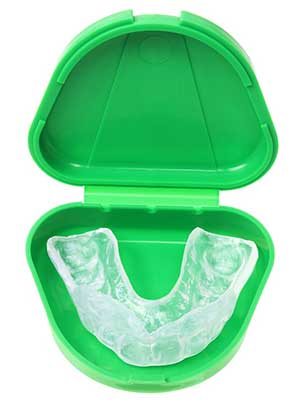
Your new night guard has its own needs and requirements, but they’re typically fairly simple. Be sure to get instructions from your dentist on the individual requirements of your brand of night guard since there are several different materials that may be used depending on what type you get. Here are some simple tips to help you keep your night guard in tip-top shape.
1. Keep Your Night Guard Fresh
Many night guards are designed to stay fresh with a simple cleaning from your toothbrush after each use. This makes sense because the night guard has been in your mouth just like your teeth. Plus, the minty scent and flavor of your toothpaste will ensure that it tastes fresh the next time you put it in.
But what if you accidentally drop your night guard on the floor or if you forget to brush it after taking it out of your mouth in the morning? Fortunately, the plastic is likely not very porous, so washing its surface off should take care of any germs. If you’re concerned, you can use a mild, non-toxic, unflavored dish soap to clean the night guard, similar to washing eating utensils.
After all, dish soap gets spoons and forks clean enough to go in your mouth, so it should be able to do the same for your night guard. Don’t overdo it on the soap, though; you don’t want to end up with bubbles in your mouth. Be sure to rinse thoroughly after using soap on the night guard, and follow it up with a good brushing with toothpaste.
2. Avoid Strong Chemicals
Some night guard materials are more sensitive to chemicals than others. For example, the SISU night guard shouldn’t be soaked in hydrogen peroxide for more than five minutes for fear of damaging its material. Other types of night guard may be soaked in peroxide solution longer, such as for thirty minutes, although you should never soak it for hours at a time.
Harsh cleaning chemicals, such as strong bleach solutions, should always be avoided. In addition to damaging the material, they could leave chemical residues that you don’t want in your mouth. You should also avoid hand sanitizer; it may damage the material and you don’t want those chemicals in your mouth all night.
3. Don’t Worry About Sterilizing Every Night
It’s true that your night guard will pick up a lot of germs after spending time in your mouth. However, the same can be said for your teeth, and you don’t take your teeth out to boil them on a regular basis, do you? Depending on the style and material of your night guard, boiling can either damage it or completely reset the shape (meaning it would need to be refitted) or both.
If your night guard’s material can handle it, you may be able to use weak hydrogen peroxide or bleach solution designed for denture cleaning. But even that doesn’t need to be done every day; once every week or so is typically plenty.
4. Ask Your Dentist If You’re Not Sure
Your dentist has more experience with your particular brand of night guard than you do. He or she can help you avoid potential pitfalls in night guard care. Sometimes, you can answer your own questions by reading the information that came with your night guard. But in situations where you’re not sure what to do, don’t be too shy to ask for help.
These four tips can help you take good care of your night guard, so it can continue to protect your enamel for years to come. Be sure to check with your dentist if you experience any odd effects from the night guard, such as a dry mouth or a shift in your bite. Call Dr. Jerry F. Maymi & Associates today to make an appointment about your night guard or other dental work.
